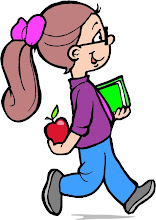We will continue with our schedule of 7 sets of 6 weeks. It is working really well for us. Let me explain how it works. The first week I plan the following five weeks of school in detail, we play a review game each day, and read a lot. Then for 5 weeks we do our regular learning (about 3 hours a day, in 1 hour segments).
BIBLE
Resources:
Bible Memory
MATH
Resources:
- BJU Press 2008 - 2009 Scope & Sequence
- The Internet
- Games for Math by Peggy Kaye find it here
- Magical Math Series of books by Lynette Long
- Making Math Easy Series of book by Rebecca Wingard-Nelson
- Adding and Subtracting Book 1 and Book 2 by Ann Montague-Smith
- Statistics by Jane Jonas Srivastava
Sets One - Seven
- One week
- Numeration
- Number Theory
- Counting
- Two weeks
- Addition
- Subtraction
- Multiplication
- Division
- Two weeks
- Algebra Readiness
- Fractions
- Decimals
- Geometry
- Estimation
- Measurement
- Throughout the weeks you can work these three in with the other topics
- Problem Solving
- Statistics & Graphs
- Calculator
GRAMMAR
Resources:
- BJU Press 2008 - 2009 Scope & Sequence
- The Internet
- The Child's Own English Book by Alice E. Ball
SPELLING
Resource:
- Spelling for Christian Schools 2
READING
Resources:
- Games for Reading by Peggy Kaye
- Step-Up Biographies and Nature Books series of books
- Reading Corner by Henry W. Forgan
- Story Train by Marjorie Pratt and Mary Meighen Second Edition
- Reading for Christian Schools 3-1 from BJU Press
WRITING
Resources:
- The Magic Pencil by Eve Shelnutt
- Games for Writing by Peggy Kaye
- Funny & Fabulous Story Prompts by Richie Chevat; Scholastic (grades 2 - 4)
- Writing Hangups by Murray Suid
Sets One - Seven:
- We will start at the beginning of Magic Pencil and work our way through, focusing more on enjoying writing than finishing the book.
- At least one activity each week from Games for Writing
- I will use Story Prompts for a change every so often
HISTORY
We will be covering American history from Christopher Columbus through the American Revolution in the context of world history.
Because much of the topic of this year is exploration, it is a good year for geography. We aren't doing anything formal on the subject, but I am having a large map of the world on our dining room table so we can find the places we read about.
Resources:
- A Child's History of the World by Virgil M. Hillyer
- The Light and the Glory for Children by Peter Marshall -- this book covers the same time period we will be covering this year: from Columbus through the American Revolution. Our library system doesn't have it, so I'm hoping to borrow it.
- Lots of library books -- these will be listed in each set's post
SCIENCE
I have a handful of activity/experiment based science books for young children. We are going through these this year. These are mostly old books and can be found on Amazon.
Resources:
- Adventures with a Straw by Harry Milgrom
- Magnify and Find Out Why by Julius Schwartz
- The Real Magnet Book by Mae Freeman
- What Happens If . . ? by Rose Wyler
- Fun with Science by Mae and Ira Freeman
- The True Book of Toys at Work by John Lewellen
- The True Book of Science Experiments by Illa Pondendorf
- Projects with Air by John Williams
- Science: Understanding Your Environment a Silver Burdett Elementary Science book
I will use these books if we want to do additional experiments on any subject:
- 365 More Simple Science Experiments by Churchill, Loeschnig, and Mandell
- Learn and Discover Fun Science by David L. Drotar
- Let's Experiment by Martin L. Keen
FINE ARTS
PIANO
We are continuing with piano this year, hoping to accomplish more as K. has become more interested in playing the piano over our winter break.
- Alfred's Basic Piano Library Level 1A
- Lesson Book
- Theory Book
- Technic Book
ART
We will be going through this book slowly and visiting a local art museum seven times.
- Let's go to the Art Museum by Virginia K. Levy
SEWING
K. has asked to learn to sew by hand this year. She has started trying to make clothes for her dolls, and the last chapter of
Miss Patch tells how to do that.
- Miss Patch's Learn-to-Sew Book by Carolyn Meyer
- Sewing is Fun by Edith Paul
CROCHET
K. also asked to learn to crochet this year.
- Teach Me to Crochet from Leisure Arts
- Crocheting by Gwen Blakley Kinsler (Kids Can Do It series)
- Kids Learn to Crochet by Lucinda Guy
